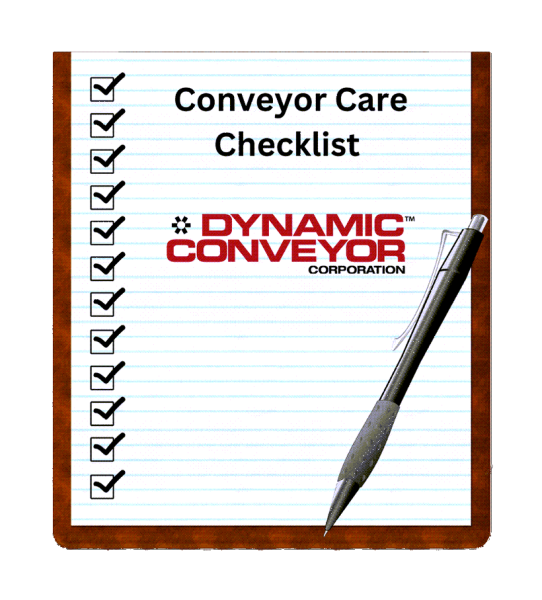This is part one of two in the Conveyor Care Series.
 Conveyors are essential for a wide variety of industries, from food production to manufacturing, and they are responsible for moving materials and products from one point to another. A conveyor system that fails can cause significant downtime and production losses, resulting in delays and lost revenue.
Conveyors are essential for a wide variety of industries, from food production to manufacturing, and they are responsible for moving materials and products from one point to another. A conveyor system that fails can cause significant downtime and production losses, resulting in delays and lost revenue.
To avoid such issues, preventative maintenance is recommended for conveyor systems. Preventative maintenance is the process of regularly inspecting, cleaning, and repairing conveyor components to ensure that they are in good working condition, reducing the likelihood of breakdowns and unexpected downtime. The advantage of Dynamic Conveyor systems is that maintenance needs are minimal. In any case, having some regular cadence to check on the health of your conveyor can only benefit you and your operation. Maintenance is like insurance – it involves taking proactive steps to prevent problems from occurring and mitigating the impact of any issues that do arise.
Here are some tips for preventative maintenance for conveyors:
1. Develop a Maintenance Schedule
Developing a maintenance schedule is the first step in ensuring that conveyor systems are maintained properly. The schedule should specify the frequency of inspection and maintenance, as well as the tasks that need to be performed. Depending on the workload of the conveyor, this may range from daily to weekly or monthly maintenance.
2. Regular Cleaning
The conveyor belt should be kept clean to prevent material build-up and reduce friction, which can cause damage to the belt and result in increased wear and tear. Regular cleaning should include removing debris, dust, and dirt from the conveyor belt, rollers, and other components. We recommend air/wipe down cleaning when the contaminant on the belt is dry. In a sanitary environment, following full washdown and sanitation guidelines are recommended.
3. Belt Inspection
Tensionless belts make the smooth operation of Dynamic Conveyor conveyors very simple and require little maintenance. Regular inspections of the conveyor belt should be conducted to identify any issues. Look for signs of wear, damage, belt elongation, and misalignment. Address any issues immediately to prevent further damage.
4. Inspection of Conveyor Components
Conveyor components should be inspected regularly to identify wear and damage. This includes the belt, rollers, bearings, motor, gearbox, and other components. Any damaged components should be replaced promptly to prevent further damage to the system. Replacement parts are available by contacting Dynamic Conveyor Customer Support.
Proper loading: Properly loading the conveyor system will help to reduce tension on the belt. Make sure the load is evenly distributed across the width of the belt and avoid overloading the conveyor.
5. Electrical Connections
Electrical connections should be inspected periodically to ensure that they are tight and secure. Loose connections can cause electrical arcing, which can damage the electrical components of the conveyor system.
In summary, preventative maintenance is helpful for conveyor systems to ensure that they operate efficiently and reliably time and time again. By following these tips, you can prevent downtime, reduce the risk of component failure, and extend the life of your conveyor system. A well-maintained conveyor system will not only save you time and money but also improve productivity and enhance safety in the workplace.
Dynamic Conveyor systems have been in production for thirty years. Customers return for more conveyors because of the minimal maintenance and low cost of ownership. Ask us how a Dynamic Conveyor can streamline your operation and minimize your maintenance time and costs, contact us to start the conversation.
Conveyor Care Part 2: Conveyor Components That Reduce Maintenance
- Celebrating Freedom, Teamwork, and a Month of Success - July 7, 2025
- Mechanical_Design Engineer - June 18, 2025
- Driving the Future of Manufacturing: Dynamic Conveyor at the Beyond Boundaries Automation Event - June 17, 2025


